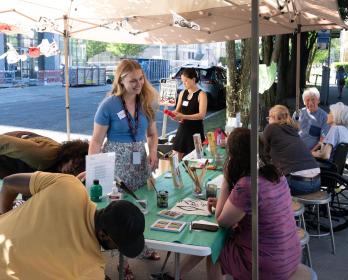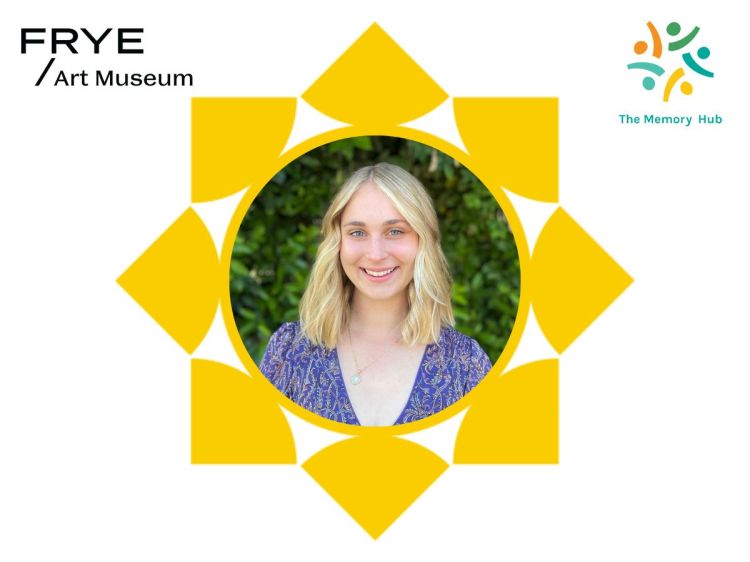Samantha Sanders is the Creative Aging Coordinator for the Frye Art Museum (Memory Hub founding partner), helping to offer programs for older adults to engage in arts and creative lifelong learning. A key part of her role includes serving as an on-site collaborator at the Memory Hub, where she manages the Alzheimer’s Café program. This program is a unique social opportunity for people living with dementia, their care partners, family, and friends to enjoy companionship, live music, and fun in a relaxed environment. Offered since 2016 by the Frye Art Museum and the UW Memory and Brain Wellness Center, the program is now hosted at the Memory Hub.
In this spotlight, Samantha shares the latest updates about the Alzheimer’s Café program, what she appreciates about being part of the Memory Hub, and her perspective on dementia-friendly community.
Interview by Genevieve Wanucha
Can you share how your interest in Creative Aging developed?
As part of my required art history internship in college, I worked at the de Young Museum with their museum ambassador program. It was an intergenerational program where I worked with about 20 Bay Area teens. We would go all over the Bay Area, bringing art into libraries and community centers. This got me working with seniors and teens together, intergenerationally. It was very exciting for me because I was living with my grandmother at the time, who was always like a second mom to me. I got invigorated working with older adults and seeing the beauty that came out of large generational gaps. I then started my capstone project, which was a deep dive into creating aging.
What do you do as the Creative Aging Coordinator for the Frye Art Museum and how did it bring you to the Memory Hub?
I started at the Frye Art Museum in June of 2022, in a position funded by one of our Creative Aging donors to support the now-retired founder of Creative Aging at the Frye, our beloved Mary Jane Knecht. In the past year, I've been interim manager of all the creative aging programs, expanding on-site administration and running all the creative aging programs here and in Bainbridge Island. I also handle registration for our classes and community engagement programs.
I think a big part of the role that attracted me was that I would be the representative liaison working to bring Frye Art Museum programs to the Memory Hub, specifically the Alzheimer's Cafe program. It has been exciting to be part of a dementia-friendly community center and learn and gather resources from other experts in fields at the crossover of art and medicine.
What do you appreciate about being part of the Memory Hub team?

Samantha Sanders at the Frye Art Museum art project table at the Brain Helath Block Party in July 2024
Everyone at the Memory Hub is so passionate, excited, and welcoming. I also really like that the Frye Art Museum staff, such as our visitor services representatives, security team, and the Learning and Engagement team, has been cross trained to refer people to the Memory Hub. It's very much a reciprocal partnership, with the Memory Hub being on the Frye campus and vice versa.
I also love to see the connection building with people in the First Hill neighborhood. At the recent Brain Health Block party, we had over 160 people at the Frye's station and over 200 at the Memory Hub station. The Memory Hub is activating the first Hill community in a new and different way. I feel like everybody can benefit from the Memory Hub. Marigrace Becker, Director of the Memory Hub, has gone in a direction of further inclusivity, not only making people living with dementia feel specifically welcomed, but also creating opportunities for older adults and the wider community with the Chinese Tai Chi and Karaoke program. It's been amazing to see the Memory Hub become a community center space.
Can you give us a highlight from 2024?
For the on-site program that I'm running, the Alzheimer's Cafe, I'm most proud of the high number of crossovers from this program and other Memory Hub programs. I know of at least three people who have done Here: Now or the Alzheimer's Café, who have joined the Elsewise Adult Day Program. There are people who have come to a caregiver reading group at the Memory Hub Library or to a summer kickoff event, and then attended the Alzheimer’s Café. I feel like people really want the in-person programming.
We continue to see an uptick in our attendance in the Alzheimer's Cafe; We had 26 people last month, which is the highest number we've had for 2024. In December 2023, we had 28, a record-breaking number. We've been consistently over 20 attendees for the past six months. I'm really excited about that direction we’re taking soon, with the integration of movement into the Alzheimer’s Café.
Here is some feedback from recent participants:
You have a great thing go in here. You bring such life into the space.
I like to get out and beyond my boundaries and today's event got me to live and be up to the challenge, thanks for gassing me up. That was so much fun.
What does it mean to you to be part of the dementia-friendly Memory Hub community?
The Memory Hub is a space of access and inclusivity. I think “Dementia Friendly” is just another way to be welcoming to all individuals, no matter where you’re coming from. Specifically for people in the memory loss community, it's feeling like you're safe and comfortable and have something structured to do. A lot of caregivers want spend time with their loved one on something that is not about medical care. It’s about experiential respite and togetherness. The socializing at the Memory Hub, I think, is unmatched.
How has dementia played a role in your own life?
I have adjacent experiences. Along with my sister, I was my grandmother's personal caregiver when I was living with her in high school, college, and two years in graduate school. She was mentally sharp, but she needed a lot of care because her body was failing her. I also had a grandmother who had passed away from Parkinson's disease. My family has a history of neurodivergence and mental illness, and I was always a family counselor from a young age, trying to understand the people around me who were living with different mental health conditions. Caring about brain health and emotional empathy has always been important to me. From a young age, I was interested in the arts, but I knew I wanted to help people who are going through illnesses, particularly those that are sometimes invisible.
What do you do in life outside of work?
I am into photography, travel, and spending time with loved ones. I'm planning a trip to Europe in the fall for two weeks around my birthday, when my fiancé and two best friends will go all over. I usually spend my weekends hiking and spending time in nature. I like taking quiet moments to appreciate beauty in architecture and nature. •






